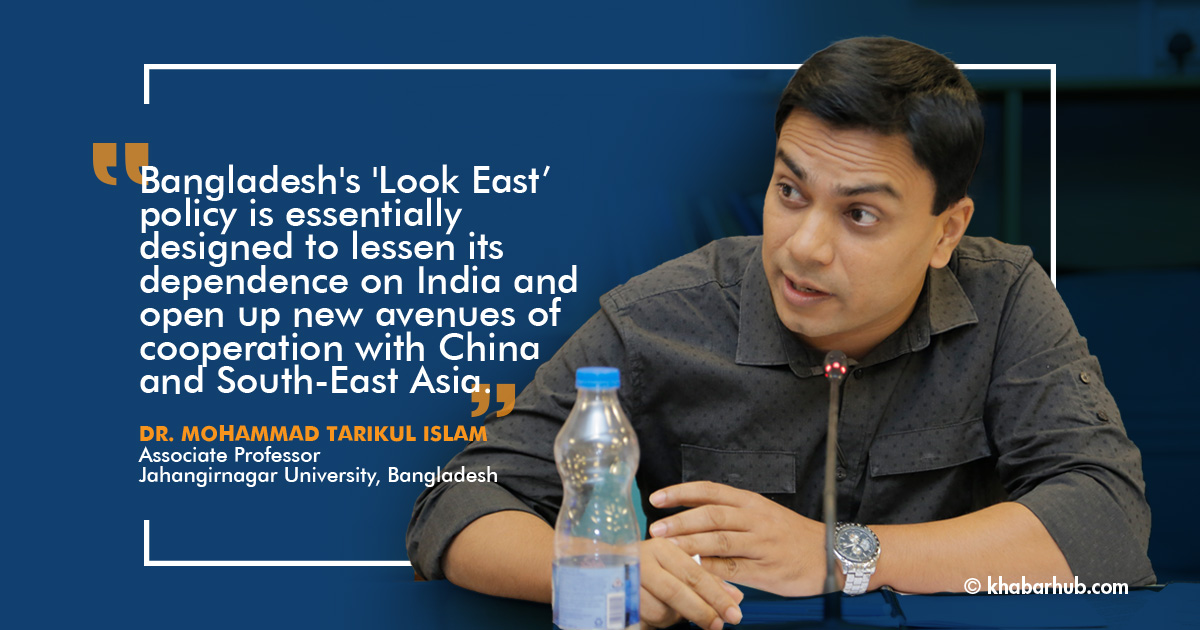Dr. Mohammad Tarikul Islam is an Associate Professor of the Department of Government and Politics at Jahangirnagar University in Bangladesh.
He has been a Visiting Scholar at the University of Oxford and the University of Cambridge, United Kingdom. Before joining the university, Dr. Islam was serving the United Nations Development Programme for a period of seven years.
The School of Oriental and African Studies (SOAS), University of London has recently appointed Professor Islam as a Visiting Fellow. Professor Islam took out some of his time to speak with Khabarhub on the recent trend of Bangladesh-China bilateral relations.
Excerpts:
How does the relationship between Bangladesh and China get closer on the basis of the partnership of cooperation?
You know, consolidation and enhancement of China-Bangladesh friendship and cooperation serve the fundamental interests of both countries, meet common aspirations of their people, and are conducive to peace and development in the region and the world.
This is why both decided to establish a “Closer Comprehensive Partnership of Cooperation” from the strategic perspective, on the basis of principles of friendship, equality and mutual benefit since the establishment of diplomatic relations between two countries in 1976, five years after Bangladesh’s independence.
Both nations exchange high-level visits and contacts and are intensifying exchanges between government agencies, parliaments, political parties, armed forces, and non-governmental groups.
They promote communication and cooperation at the local government level and enhance bilateral cooperation mechanisms, including diplomatic consultations, joint economic and trade committees and joint agriculture committees.
To bridge the massive trade gap between them, China has not only provided economic aid to Bangladesh but also signed the Asia Pacific Trade Agreement (APTA) to remove tariff barriers from commodities imported from Bangladesh.
Under the framework of the Asia-Pacific Trade Agreement (APTA), China removed tariff barriers on 84 types of commodities imported from Bangladesh, including jute and textiles (chief exports of Bangladesh).
China has offered to develop natural gas resources and nuclear power plants in Bangladesh, to meet its growing energy requirements.
The landlocked Yunnan province of China has sought economic cooperation with Bangladesh to help gain access to the Bay of Bengal.
Bangladesh too has offered to set up a Special Economic Zone for China. Generally speaking, the Agreement on Economic and Technical Cooperation and a framework agreement on a concessional loan provided by China to Bangladesh are two significant treaties signed between the two nations.
Is there any influence of the ‘Look East’ policy on broadening the bilateral relations between the two countries?
Bangladesh’s ‘Look East’ policy is essentially designed to lessen its dependence on India and open up new avenues of cooperation with China and South-East Asia.

I believe, in the process of ensuring this, Bangladesh’s dependence on China has gradually increased, thereby giving Beijing greater leverage in bilateral ties.
Connectivity is essential to enhance mutual cooperation. In this regard, China and Bangladesh have been negotiating and have decided to build a 900 km highway project to connect Chittagong and Kunming through Myanmar.
This highway would give Bangladesh entry into the Mekong sub-region, which already includes China, accelerate trade and facilitate people-to-people contact.
This would not only overcome the long sea passage, from the east coast of China through Singapore (for trans-shipment) to Bangladesh, but would also lower transport costs and add to the economy of Yunnan province.
This also fits well with their joint initiative of improving Chittagong port infrastructure for dual-use, for merchant vessels and also for the navies of both countries.
Apparently, Bangladesh Prime Minister Sheikh Hasina has adopted a diplomatic outlook in line with the guiding principle of the country’s Constitution, “Friendship towards all, malice toward none.”
However, in trying to ensure this, Bangladesh’s dependence on China has increased. Both nations have pledged to cooperate more closely, ensuring long-term friendship, equality and mutual benefit to sustain their “time tested all-weather friendship”.
Sino-Bangladesh relations are not only a matter of closer, comprehensive cooperation, but a dynamic process that has metamorphosed from an economic partnership into the realm of strategic partnership.
How BCIM and BRI facilitate making mutual cooperation deeper?
Yes, connectivity through the BCIM economic corridor has the potential to benefit South Asian countries. Bangladesh–China–India–Myanmar Forum for regional cooperation (BCIM) is a sub-regional entity of Asian nations aiming for greater integration of trade and investment between them.
From the early 1980s, the Bangladesh Army has been equipped with Chinese tanks, its navy has Chinese frigates and missile boats and the Bangladesh Air Force flies Chinese fighter jets. In 2002, China and Bangladesh signed a “Defence Cooperation Agreement”.
Through the Belt and Road Initiative (BRI), China plans to engage in the global economy by investing in the physical infrastructure. In order to rebuild the land network connecting China to Europe via Central Asia (“One Belt”) and the maritime route from China to Southeast Asia, South Asia, the Middle East, and Eastern Africa (“One Road”), BRI has been in place.
So far, 136 countries and 30 international organizations have signed 194 cooperation documents with China to take a “Belt and Road” cooperation forward for opening up a new paradigm in collective development efforts.
How do the Rohingya crisis and geopolitical aspects shape bilateral relations?
Seemingly, China has geopolitical interests in Myanmar. Myanmar allows China access to the Indian Ocean. For example, China is funding Kyauk Phyu port, a base of an oil-gas pipeline and road link from the Bay of Bengal, through Myanmar to Yunnan province of China, shortening supply routes from the Middle East.
The port has opened up a trading estate for developing a special economic zone in the Rakhine state of Myanmar. China’s ambitious BRI is thus profoundly reliant on good relations with Myanmar.
A further factor is that China has been tensed by Myanmar’s recent foreign policy outlook towards the West.

You have surely perceived the very recent condemnation of Myanmar by the West over its treatment of the Rohingyas is found in Beijing as a chance to restore close bonds with the country. Beijing has along these lines been a vocal ally of the Myanmar government regionally and globally.
Plainly, China had applied its veto power over the decision the United Nations Security Council wanted to take a joint statement condemning the military’s actions in Myanmar. Moreover, the Chinese government had described the military takeover and detention of Suu Kyi as a major cabinet reshuffle.
Will the‘ Indian Factor’ influence the relations of Bangladesh with China?
Bringing India into Bangladesh-China bilateral relations should not be realistic rather Bangladesh should have its own strategy based on foreign policy to deal with India, China, the USA, and other great powers separately.
Amid India-China tensions in eastern Ladakh in June 2020 as well as growing tensions with Nepal, India has found itself isolated from its neighbors in part thanks to increasing Chinese influence in the region.
Having both commercial and political stakes in Bangladesh, New Delhi expected Dhaka’s support in the ongoing conflict with China.
But to New Delhi’s surprise, Dhaka did not take a side. Instead, Bangladesh took a neutral stance and called for peaceful settlement of contentious issues. Such a neutral stand speaks about the ripened leadership Bangladesh has demonstrated and conveyed a clear message to shape issues to capitalize on national interests, I believe.
As an Academic, how do you see the present bilateral relations between China and Bangladesh? is it guiding based on the win-win situation?
The geographic area encompassing South Asia and its contiguous maritime spaces is of growing strategic importance to China, reflected in its web of partnerships and coalitions with regional states.
The dynamics of these relationships appear on the surface to be based on interdependence but are actually driven by long-term political, economic and strategic interests. Bangladesh is an important player among South Asian states for China’s political-military realism.
Such a strategic partnership with Dhaka provides Beijing with added leverage to check Indian forces. This is evident from the regular political exchanges and enhanced military cooperation between the two countries.
Clearly, Prime Minister Sheikh Hasina is now trying to capitalize on the geopolitical advantage that Bangladesh enjoys as a country that overlooks the strategically important sea lanes of the Indian Ocean linking China with the Persian Gulf, which have a role in securing energy supplies for Beijing.
Such an approach speaks of her vision to move ahead with an essentially ‘win-win’ situation, by leaving behind China’s hostile attitude during Bangladesh’s liberation war in 1971.
Last but not least, as Bangladesh and China have continued to consolidate their bilateral relations over the decade, China must come forward to join hands with the Bangladesh government for a swift repatriation of Rohingya refugees.








Comment